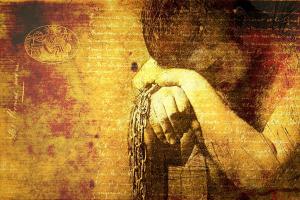
Sin is such an emotionally laden term. It is often associated with heaviness and accusation – the angry finger of a vengeful God, wagging in our unworthy faces. Any Biblical term, if misused, becomes associated with the misuse itself, and can become misleading. In this sense, the Church, by means of its doctrinal and cultural assumptions, can reshape important Biblical concepts in its own image. I believe this has happened with sin/sinner/sinful.
In this post, I intend to drain all negative associations from the word ‘sin’ and start from scratch by asking a simple question – What makes an action/choice sinful? I propose that sin is not a list of forbidden activities. This shouldn’t be controversial, but the reactions I sometimes get within Christian communities, when stating this, range from indignation to horror.
‘What about the ten commandments? That’s a list!’ is a common response. I see the point. There are several lists of ungodly behaviours in the epistles, along with the impossible strictures of Hebrew Law. But, and this is important, the presence of lists of sinful behaviour does not explain why any one of those behaviours qualifies as sin. Is there something innate in certain activities/choices that offends God? Is the Lord a prude or a snowflake?
Let’s take the example of lying, or as Moses chiselled in Exodus 20, 16a:
‘Thou shalt not bear false witness…’
Relying only on the scriptures, can we say that lying is always wrong? Looking at the story of Rahab, in the early chapters of Joshua, we cannot hold to that judgement. Rahab was a prostitute, living in Jericho as the Israelites scouted the land in preparation for an invasion of the city. Not only did she harbour Israelite spies, but she lied to the authorities, saying she had not seen them, and then sent the spies off in another direction. Somehow Rahab knew what the other citizens of Jericho didn’t – that the city was going to fall – so she helped the spies out to save her own life and the lives of her family members. By any measure this is both lying and treason. And yet, Hebrews says her actions sprang from faith, (chapter 11, 31):
‘By faith the harlot Rahab did not perish with those who did not believe, when she had received the spies with peace.’
James goes further, explaining that she was justified by her actions – i.e. she received salvation through faith. For James, that means that her lies were the moving part in her faith response to the knowledge of God. James 2, 25:
‘Likewise, was not Rahab the harlot also justified by works when she received the messengers and sent them out another way?’
Rahab is also celebrated as part of the lineage of Jesus.
So why was lying not sinful, in her case? Before I suggest an answer, it is worthwhile to look at other Biblical examples of actions that loosen the lid. In Acts 9, Peter has a vision while praying on a rooftop (v. 9-16):
‘About noon the following day as they were on their journey and approaching the city, Peter went up on the roof to pray. He became hungry and wanted something to eat, and while the meal was being prepared, he fell into a trance. He saw heaven opened and something like a large sheet being let down to earth by its four corners. It contained all kinds of four-footed animals, as well as reptiles and birds. Then a voice told him, ‘Get up, Peter. Kill and eat.’
‘Surely not, Lord!’ Peter replied. ‘I have never eaten anything impure or unclean.’
The voice spoke to him a second time, ‘Do not call anything impure that God has made clean.’
This happened three times, and immediately the sheet was taken back to heaven.’
The primary purpose of the vision was to tell Peter that all people under heaven, whether Jew or Gentile, were considered clean by God – a radical departure from his Jewish tradition, which taught that only Jews were clean in God’s sight. The promise which God made to Abraham – that through him, ‘all families of the world will be blessed’ – was coming to fruition. It was forbidden by Hebrew Law for a Jew to visit a gentile, but the first thing Peter did after seeing this vision was to go to the house of a Gentile and lead him, his family and all his friends to the Lord. What was sinful prior to the vision (visiting a Gentile) became pure after the vision. Not only was it pure, but to refuse to visit the Gentiles would have been sinful, because God commanded it. What was sinful became pure, and what was pure became sinful, in the time it took for Peter to see God’s vision.
Similarly, the embargo on eating certain animals was lifted, and what was sinful before the vision became pure afterwards.
Romans 14 is perhaps the most explicit passage, when it comes to matters of conscience and their relationship to sin. Paul discusses faith, sin and conscience with regards to several matters, starting with what we eat (v. 2-3):
‘One person’s faith allows them to eat anything, but another, whose faith is weak, eats only vegetables. The one who eats everything must not treat with contempt the one who does not, and the one who does not eat everything must not judge the one who does, for God has accepted them.’
He also touches on how (or even if) we celebrate the Sabbath (v. 5-6a):
‘One person considers one day more sacred than another; another considers every day alike. Each of them should be fully convinced in their own mind. Whoever regards one day as special does so to the Lord.’
He warns against judgement of each other (v. 10-12):
‘You, then, why do you judge your brother or sister? Or why do you treat them with contempt? For we will all stand before God’s judgment seat. It is written:
‘“As surely as I live,” says the Lord,
“Every knee will bow before me;
every tongue will acknowledge God.”’
So then, each of us will give an account of ourselves to God.
He emphasises a personal relationship with God and the importance of motivation. An action can become sinful if it violates a person’s conscience, even when there is nothing wrong with the action itself (v. 14):
‘I am convinced, being fully persuaded in the Lord Jesus, that nothing is unclean in itself. But if anyone regards something as unclean, then for that person it is unclean.’
Having laid out a brief set of examples – eating, drinking, partaking in food sacrificed to idols, and how an individual approaches the Sabbath – Paul sums up with some key principles that can be applied much more broadly than in this chapter alone (v. 22-23):
‘So whatever you believe about these things keep between yourself and God. Blessed is the one who does not condemn himself by what he approves. But whoever has doubts is condemned if they eat, because their eating is not from faith; and everything that does not come from faith is sin.’
If anything that doesn’t come from faith is sin, then unavoidably, anything done in faith cannot be sin. Rahab is a perfect example of that principle at work – she lied, but did so in faith, and was rewarded by God for it.
I realise this is deeply unsettling for some, because it raises a difficult question – can anything be done in faith, and therefore be pure, just as Rahab’s lie was pure? Could I attack a stranger and steal his wallet in faith? No, and no again, because faith can only access what grace has provided. We are not our own masters. We can only act in faith when following the leading of the Holy Spirit, and he will not lead me to attack a stranger in the street, or in any other unloving act. We follow love, we serve love, and love leads us for our own good and the good of others. I’ll say it once more – faith can only access what grace has provided.
So what is sin? If it is not a list of forbidden activities, and if some matters can only be defined as either sinful or pure according to the intentions and conscience of the individual; if an action can be sinful one moment and pure the next, as in Peter’s case; if anything done in faith is not sin; if grace will only lead us in love toward God, ourselves and others, can we reach a simple, working definition that applies to all?
I believe we can. Sin is anything that harms ourselves or other people. I hope readers will test the concept. Can you think of anything you consider sin that isn’t described by this? If you can, I hope you will leave a comment for discussion.
This definition is useful, because it helps lighten a heavy image of God. Sin has to be sin for a reason, or God is arbitrary, whimsical, cruel, and a rule-keeping perfectionist. What reason does God have to consider something sinful, if not that it is harmful to us, those we love, or both? God wants us to be free of sin because, quite simply, he loves us, and life is better in its absence. God is not a jailor, punishing sinners; he is a rescuer, swinging wide the jailhouse doors and leading us to freedom.
To take a simple example – gluttony is sinful because it harms ours bodies, and worries those who love us. Perhaps we will die prematurely, bringing avoidable grief to our families. Importantly though, God is not wagging his finger at obese people, condemning them. He wants his creations to enjoy their lives and live them to the full. God is all about the removal of harm from our lives, but all in his time. Let’s say I have ten sinful habits. He will not love me more, or receive me more joyfully into Heaven, when I’ve reduced that to zero. He just wants me to be free, and will lead me into liberty over the course of my life as I walk closely with him.
Sin has been presented in unloving ways that put people off church, faith, and God. Instead of teaching that Our Father wants to liberate us, because of love, we have taught that God is watching us, in case we sin. We elevate judgement and diminish mercy, but that does not reflect the nature of Christ. James 2, 13b:
‘Mercy triumphs over judgment.’
As a young man, I was deeply concerned with sin. I had been taught that sinful actions created a spiritual barrier between God and I, preventing me from drawing near to him until I’d repented. Imagine the effect that had on a young man, desperate to please God but unsure of his loving nature. If I did something sinful, I would literally beg God to forgive me until my emotions changed. It was torture, and surely grieved the heart of my loving Father in Heaven, who never wants us to grovel. Heb 4, 15-16:
‘For we do not have a High Priest who cannot sympathize with our weaknesses, but was in all points tempted as we are, yet without sin. Let us therefore come boldly to the throne of grace, that we may obtain mercy and find grace to help in time of need.’
When do we most need mercy? When we’ve sinned and when we’re struggling. Our great High Priest, Jesus, knows what it is like to endure temptation, and has provided the way for us to overcome it. Even when we’ve sinned, God does not require that we grovel, or see ourselves differently. If we come to the throne of grace to obtain mercy, he would have us come boldly. Jesus is our advocate, our redeemer, our friend and brother, and he will help us overcome. Those who know who they are in Christ, can receive from Christ.
As a young adult I saw God as fault-finding and strict, with a specific list of ‘dos and don’ts’ I had to live by to remain in his favour and avoid his wrath. The mature believer embraces a more fluid truth – we make strong, loving and faith-filled decisions in response to the leading of the Spirit, who we trust to lead us out of captivity and into freedom. It is a journey of ever-increasing liberty (freedom from captivity), in the company of the One who loves us most.
It is my firm belief that we, the Church, are guilty of driving away those who might come to know Christ, by speaking of sin in archaic, heavy and condemning terms. If sin is something that harms us or others, then addressing it in ourselves is only positive and life-giving. I believe we need to drain the fetid moat of self-hatred and rejection, of flagellation and condemnation, from our struggles, and embrace Spirit-led, personal growth.
Paul defines healthy repentance in 2 Corinthians 7, 10:
‘Godly sorrow brings repentance that leads to salvation and leaves no regret, but worldly sorrow brings death.’
Worldly sorrow requires turning on yourself, leaving yourself with terrible regrets, but godly sorrow comes without that burden on regret, because repentance shouldn’t be heavy and self-condemning. In the same passage, Paul writes that godly sorrow produces earnestness, alarm, longing, concern, and readiness to see justice done. In other words it produces action, and change. If weighed down by regret and condemnation, sorrow does not lead to repentance, but to self-hatred, and a vicious circle of failure.
Human regret is such a pit, and self-condemnation is in itself, sinful, because it damages us. If we understand that God has not written an arbitrary list of sins, but wishes to free us from anything that harms ourselves or other people, the process becomes soft, compassionate and loving.
Imagine how the world might respond, if every church was a community of people on an exciting, liberating journey of personal transformation. Imagine if our lives shone with the fruit of godly sorrow, which is repentance, which in turn leads to growth, change and victory. Imagine if every congregation thronged with individuals and groups who truly accepted the grace and mercy of God in their lives, and who were being transformed from glory to glory. Imagine if we preached the truth – that through the cross, Jesus triumphed over sin, and that through his Spirit, we can take hold of that victory stage by stage, piece by piece, and be made new. 1 Cor 15, 54-57:
‘When the perishable has been clothed with the imperishable, and the mortal with immortality, then the saying that is written will come true: ‘Death has been swallowed up in victory.’
‘Where, O death, is your victory?
Where, O death, is your sting?’
The sting of death is sin, and the power of sin is the law. But thanks be to God! He gives us the victory through our Lord Jesus Christ.’












